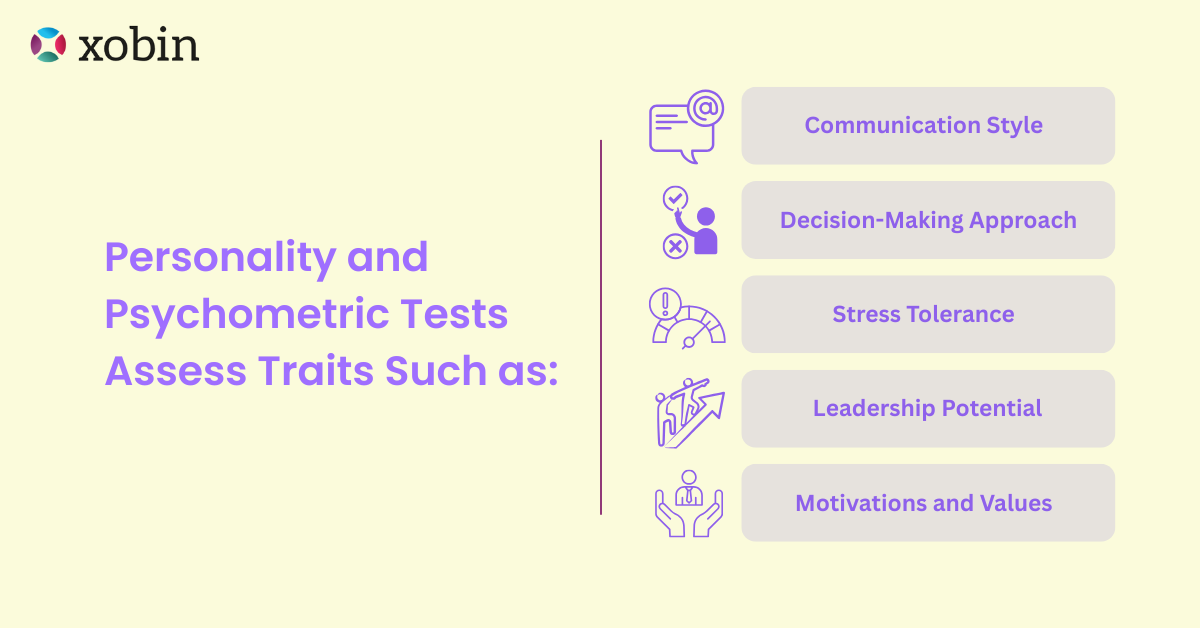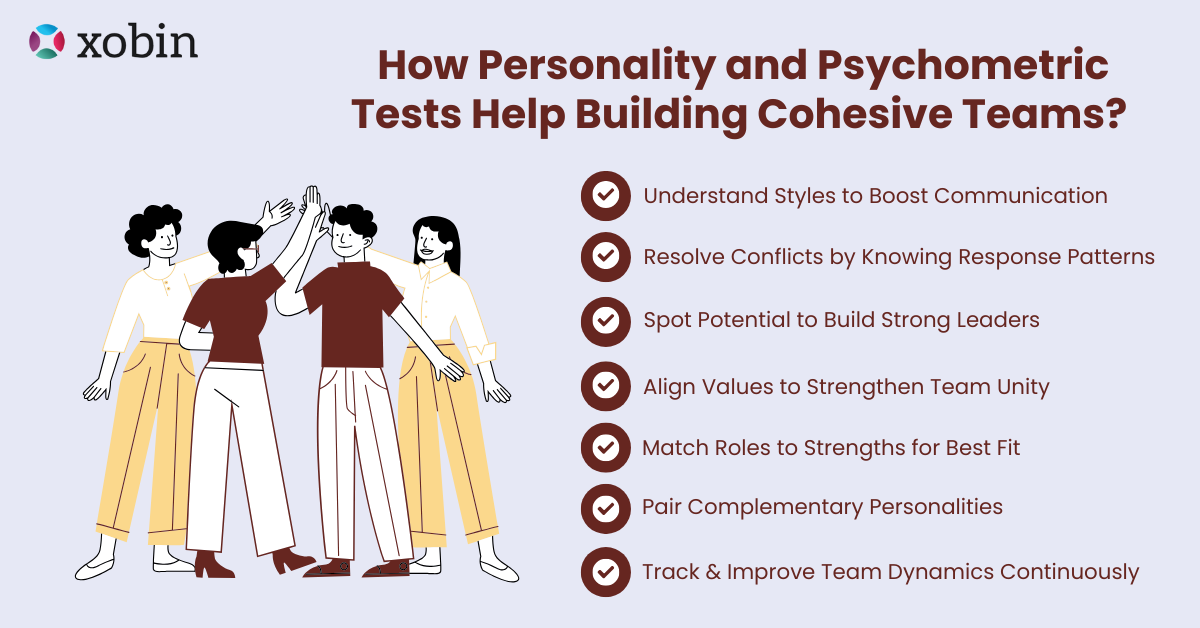Looking to build stronger, more cohesive teams? Start by integrating personality and psychometric tests into your recruitment and team development strategies. These tests reveal how individuals think, communicate, lead, and respond to stress, allowing recruiters to form balanced teams, assign roles strategically, and boost collaboration. From identifying complementary personalities to aligning core values, this blog uncovers powerful ways to build high-performance teams using psychometric testing for long-term team success.
Table of Contents
TL;DR – Key Takeaway!
- Understand team dynamics beyond resumes by using personality and psychometric tests to assess traits like communication style, stress tolerance, and decision-making.
- Build balanced teams by combining complementary personalities like creative minds, planners, collaborators, and leaders.
- Boost team communication by identifying each member’s preferred style and tailoring interactions to reduce friction.
- Predict and resolve conflict effectively by recognizing how each personality reacts under stress or disagreement.
- Identify leadership potential early by analyzing traits like resilience, confidence, and emotional intelligence through psychometric tests.
- Align team values and motivations to foster unity and drive long-term retention and engagement.
- Assign roles more effectively by matching strengths to tasks, ensuring both productivity and job satisfaction.
- Use scientifically backed personality and psychometric tests to create high-performing, cohesive teams that drive organizational success.
What Are Personality and Psychometric Tests?
Personality and Psychometric Tests are scientifically designed assessments that measure behavioral traits, cognitive abilities, and emotional intelligence. These tests provide data-driven insights into team dynamics, leadership potential, and cultural fit. Integrating these assessments into hiring and development strategies, you can enhance your organizational performance, reduce turnover, and build resilient, high-performing teams aligned with long-term business goals.
Why Are Personality and Psychometric Tests Important for Team Building?
Before diving into practical uses, it’s crucial to understand why these tests matter. Traditional hiring focuses primarily on qualifications and technical skills. However, team success depends equally on interpersonal skills, emotional intelligence, and cultural fit.

Personality and psychometric tests measure these often overlooked but critical factors. They assess traits such as
- Communication style
- Decision-making approach
- Stress tolerance
- Leadership potential
- Motivations and values
You can build balanced teams that complement each other’s strengths and compensate for weaknesses with this knowledge.
7 Ways Personality and Psychometric Tests Helps in Effective Team Building

1. Identify Complementary Personality Types to Build Balanced Teams
One of the biggest mistakes in team building is clustering people with similar personalities. While it may seem comfortable initially, this often leads to groupthink and conflicts when everyone thinks alike or clashes due to identical dominant traits.
Personality and psychometric tests reveal the core traits of each team member, such as extroversion, openness, conscientiousness, and emotional stability. By analyzing these results, recruiters can purposefully combine complementary personalities.
For example, pairing creative thinkers with detail-oriented planners fosters innovation grounded in practicality. Combining assertive leaders with empathetic collaborators ensures direction without alienation.
This balanced approach promotes diverse perspectives and smoother teamwork.

2. Improve Communication Through Understanding Individual Styles
Communication breakdowns cause many team failures. Each person processes information differently. Some prefer direct, concise communication, while others need context and warmth.
Psychometric tests identify communication preferences and social interaction styles. Knowing whether a team member is an introvert or extrovert, analytical or empathetic, helps tailor messages and avoid misunderstandings.
When teams understand how each member prefers to communicate, they adapt their style accordingly. This leads to fewer conflicts, more open dialogues, and a collaborative environment.

3. Strengthen Conflict Resolution by Recognizing Stress and Response Patterns
Conflict is inevitable in any team, but how members respond can make or break relationships. Personality and psychometric assessments can predict how people react under pressure or disagreement.
Some individuals may withdraw to avoid conflict, while others might confront aggressively. Recognizing these patterns early allows recruiters and managers to mediate more effectively and assign roles in conflict resolution accordingly.
For example, a calm, patient personality might serve as a mediator, while a more assertive person takes charge of negotiations. This insight reduces tension and promotes constructive problem-solving.
Want to reduce team friction before it starts? Use data-backed personality insights to create harmony from the beginning. Explore how AI-based psychometric tests can help!
Book A Demo4. Enhance Leadership Development by Identifying Potential and Style
Not everyone is cut out to lead in the same way. Leadership requires a unique combination of traits such as decisiveness, empathy, resilience, and vision.
Personality and psychometric tests provide an objective view of leadership potential by evaluating traits like confidence, motivation, and interpersonal skills. This helps identify emerging leaders and understand their natural leadership style.
Recruiters can then nurture these individuals with personalized development programs, ensuring future leaders are well-equipped to manage diverse teams.
5. Foster Team Cohesion by Aligning Values and Motivations
Team members driven by shared values and goals naturally form stronger bonds. However, aligning these motivations without clear insight is challenging.
Personality and psychometric tests delve into core values, motivators, and work preferences. This enables recruiters to form teams with a unified purpose and compatible aspirations.
For example, individuals motivated by innovation thrive together, while those driven by stability excel in consistent, process-driven teams. Aligning these factors creates harmony and improves long-term retention.
Hiring for skills is important, but aligning values and motivations is the real game-changer. Discover how to map your team’s internal drivers using psychometric tests
Book A Demo6. Optimize Role Allocation Based on Strengths and Weaknesses
Assigning the right roles to the right people maximizes productivity and job satisfaction. Relying solely on resumes can miss critical personality-driven capabilities.
With psychometric assessments, recruiters gain a detailed profile of each candidate’s cognitive abilities, problem-solving style, and personality traits. This information guides smarter role placement.
For example, analytical thinkers might excel in data-heavy roles, while empathetic communicators perform better in client-facing positions. Role optimization reduces turnover and accelerates team effectiveness.

7. Monitor Team Dynamics Continuously Adapt and Improve
Team building is not a one-time event. Teams evolve, and so do their dynamics. Regular use of personality and psychometric tests allows organizations to monitor changes and adapt strategies accordingly.
Continuous assessment helps spot emerging conflicts, burnout risks, or disengagement before they affect performance. It also supports ongoing development through coaching and training tailored to current needs.
By adopting a proactive approach, recruiters ensure teams remain resilient and aligned with organizational goals.

How Xobin’s Psychometric Testing Software Supports Effective Team Building
While many tools claim to provide psychometric insights, choosing the right software is essential for accuracy and usability. Platforms like Xobin’s psychometric testing software offer scientifically validated tests, intuitive dashboards, and detailed analytics.
These features empower recruiters to:
- Access diverse personality and psychometric tests.
- Generate clear, actionable reports.
- Compare team profiles easily.
- Customize assessments for specific hiring or development needs.
Leveraging advanced technology ensures your team-building efforts are data-driven and impactful.
The best teams are built with clarity, not guesswork. Transform your hiring and team-building strategy with Xobin’s advanced ai-based psychometric testing trusted by 5000+ of growing businesses.
Book A DemoFrequently Asked Questions (FAQs)
1. What are personality and psychometric tests?
Personality and psychometric tests are tools used to measure behavioral traits, cognitive abilities, and emotional intelligence. They help recruiters understand how candidates think, interact, and handle stress enabling smarter hiring and team building.
2. How do these tests improve team building?
These assessments uncover hidden strengths, communication styles, and motivational factors. By analyzing this data, recruiters can build diverse, complementary teams that perform better and have fewer internal conflicts.
3. Are psychometric tests reliable for hiring and team management?
Yes. When validated scientifically and administered correctly, psychometric assessments provide consistent, objective insights. They remove guesswork and reduce bias in both hiring and team development.
4. When should a recruiter use psychometric testing in the hiring process?
It’s ideal to use them after initial screening and before final interviews. This allows you to compare shortlisted candidates on deeper traits beyond resumes and also see how well they would fit into existing team dynamics.
5. Why should I choose Xobin’s psychometric testing software?
Xobin provides a full suite of scientifically validated personality and psychometric tests, user-friendly analytics, and real-time candidate insights, making it easy to hire right and build cohesive teams. Plus, it’s designed for modern recruiters, without unnecessary complexity.







